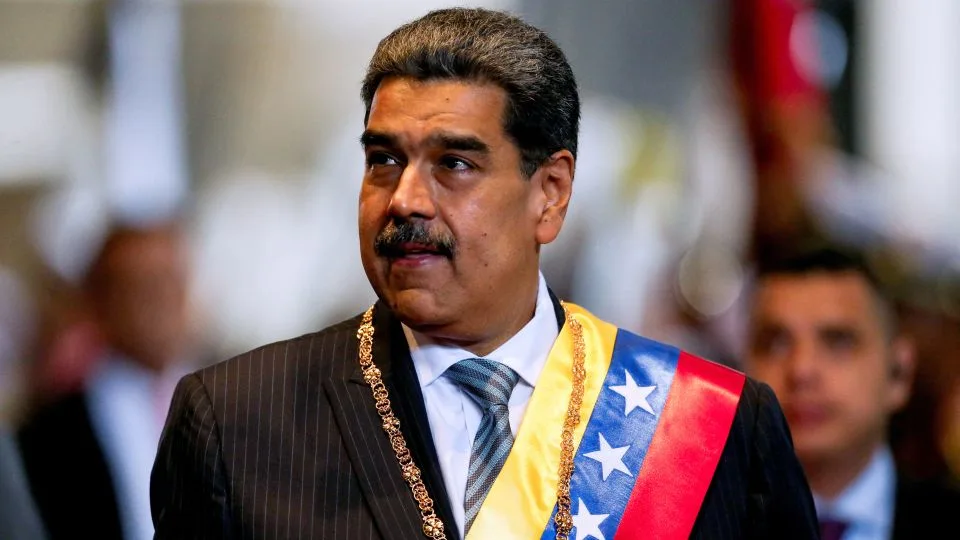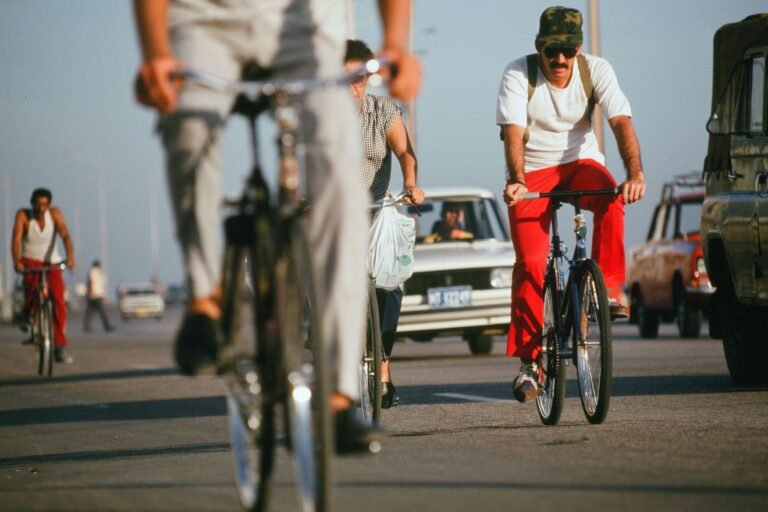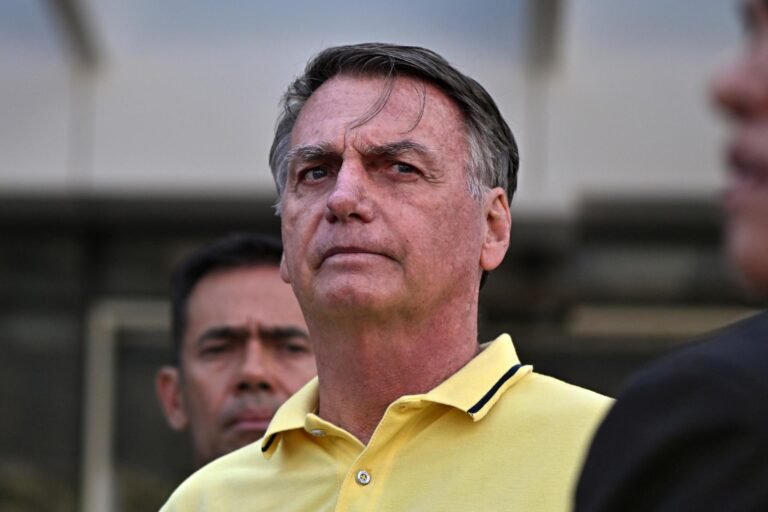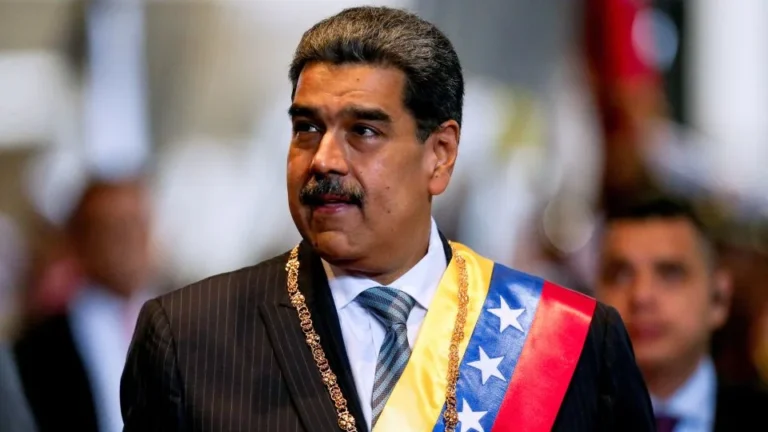
A Nation Under Siege
In August 2025, Venezuelan President Nicolás Maduro brandished a shiny new Huawei phone during a speech, claiming it was a gift from China’s Xi Jinping. With a playful “Ni hao” and “Xiexie,” he boasted of satellite calls to Beijing, a theatrical gesture that screamed defiance amid escalating U.S. pressure. As U.S. warships patrol the Caribbean and sanctions tighten, Maduro’s overtures to China signal a desperate plea for support—but will Beijing, a cautious giant, step in to shield its ally?
The Context of Crisis
Venezuela’s economy, crippled by years of mismanagement and sanctions, teeters on the brink. The U.S. has doubled its bounty on Maduro to $50 million, labeling him a narco-trafficker, while deploying naval forces to curb alleged drug cartels. Maduro’s call to China isn’t just diplomatic showmanship—it’s a lifeline for a regime increasingly isolated on the global stage.
A Personal Stake in the Story
I remember visiting Caracas years ago, where vibrant street markets buzzed despite the looming shortages. Locals spoke of hope, but also fear, as political divides deepened. Today, that same city faces a new layer of tension, with Maduro leaning on China to counter U.S. aggression, a move that could reshape Venezuela’s future.
The Roots of Venezuela’s Alliance with China
Venezuela and China have been partners for over five decades, with ties deepening under Hugo Chávez and continuing under Maduro. China’s investments, particularly in oil, have propped up Venezuela’s economy, but the relationship is more than economic—it’s a strategic counterweight to U.S. influence.
A History of Mutual Benefit
Since formalizing diplomatic relations in 1974, China has invested over $60 billion in Venezuela, largely through loans-for-oil deals. By 2025, China remains Venezuela’s largest creditor, with a $2.71 billion trade surplus in 2024. These ties have funded infrastructure and kept Caracas afloat amid Western sanctions.
Maduro’s Public Embrace of Beijing
Maduro’s recent gestures—like flaunting his Huawei phone—aren’t subtle. During a speech at the First Pedagogical Congress of Bolivarian Teachers in August 2025, he praised China’s role in economy, science, and technology, signaling to both domestic and international audiences that Venezuela has a powerful ally.
China’s Cautious Diplomacy
China’s ambassador to Venezuela, Lan Hu, has echoed Maduro’s rhetoric, criticizing U.S. “unilateral coercive measures” during the 50th anniversary of diplomatic ties in 2024. Yet, Beijing’s statements, like those from Foreign Ministry spokesperson Mao Ning, remain measured, opposing U.S. intervention but stopping short of concrete commitments.
U.S. Pressure: A Growing Threat
The Trump administration’s aggressive stance has pushed Venezuela into a corner. From naval deployments to bounties on Maduro, the U.S. is flexing its muscle, framing its actions as a fight against narco-terrorism. But is this about drugs, or a broader geopolitical play?
The Caribbean Naval Buildup
In August 2025, the U.S. deployed three destroyers, a nuclear submarine, and 4,000 personnel to the Caribbean, citing drug trafficking concerns. A deadly strike on an alleged Venezuelan drug boat killed 11, escalating tensions. Maduro called it “the greatest threat in 100 years,” deploying 4.5 million militiamen in response.
The $50 Million Bounty
The U.S. doubled its reward for Maduro’s arrest to $50 million, accusing him of leading the Cartel of the Suns. This move, coupled with labeling groups like Tren de Aragua as terrorist organizations, signals a broader campaign to destabilize Maduro’s regime.
A Show of Force or Regime Change?
Analysts like Christopher Sabatini argue the U.S. buildup is more performative than practical, as 4,500 troops can’t invade a nation like Venezuela. Former ambassador Jimmy Story likened it to “using a blowtorch to cook an egg.” Yet, the pressure could fracture Maduro’s inner circle, targeting their illicit revenue streams.
| Action | U.S. Objective | Venezuela’s Response |
|---|---|---|
| Naval deployment | Combat drug cartels | Deployed 4.5M militiamen |
| $50M bounty on Maduro | Pressure regime | Rejected accusations, called for peace |
| Strike on drug boat | Disrupt trafficking | Condemned as intervention |
China’s Calculated Response
China’s relationship with Venezuela is lucrative but delicate. While Beijing values Caracas as a partner, it’s wary of being drawn into a direct confrontation with the U.S. So, what’s China’s next move?
Economic Lifeline, Not Military
China’s support has been economic, not militaristic. A private Chinese company plans to invest over $1 billion to produce 60,000 barrels of oil daily by 2026, bolstering Venezuela’s economy. José Antonio Hernández Macías from UNAM notes this has prevented a deeper crisis.
Beijing’s Reluctance to Escalate
Despite Maduro’s pleas, experts like Gabriel Pastor from CERES argue China won’t intervene militarily. Beijing’s statement condemning U.S. deployments as violations of the UN Charter is “politically correct” but lacks actionable support. China fears losing leverage if Venezuela shifts to a Western-aligned government.
A Delicate Balancing Act
Javier Corrales, a political science professor, suggests China prioritizes stability to protect its investments. A democratic transition could expose unfavorable deals, so Beijing treads carefully, offering rhetorical support but avoiding direct conflict with the U.S.
Comparing Global Responses
Other nations have weighed in, reflecting the broader geopolitical stakes. Comparing their stances highlights China’s cautious approach.
| Country/Group | Position on U.S. Pressure | Support for Venezuela |
|---|---|---|
| China | Condemns U.S. interference | Economic support, no military aid |
| ALBA | Rejects U.S. threats | Urges regional unity |
| Iran | Condemns U.S. actions | Rhetorical support |
| U.S. Opposition (e.g., Ilhan Omar) | Criticizes “lawless” actions | Calls for Congressional oversight |
Pros of China’s Support for Venezuela
- Economic Stability: Investments mitigate Venezuela’s crisis.
- Diplomatic Ally: China’s global influence counters U.S. pressure.
- Trade Benefits: $2.71 billion surplus strengthens ties.
Cons of China’s Support
- Limited Commitment: No military or significant political backing.
- Risk of Isolation: Aligning with Maduro alienates Western nations.
- Economic Risk: Investments tied to a volatile regime.
The Human Cost of the Standoff
Beyond geopolitics, ordinary Venezuelans bear the brunt of this tension. I recall a conversation with a Caracas taxi driver who dreamed of stability but feared escalation. His story echoes millions who face shortages, violence, and uncertainty as global powers jostle.
A Nation on Edge
The U.S. buildup and Maduro’s militia mobilization have heightened fears of conflict. Social media posts reflect Venezuelans’ anxiety, with some calling for peace and others bracing for “maximum rebellion.” The human toll of this standoff is palpable.
Maduro’s Defiant Rhetoric
Maduro’s speeches blend bravado and pleas for peace. He’s called the U.S. a “Goliath” to Venezuela’s “David,” urging dialogue while vowing to defend “sacred soil.” His appeal to Trump’s Nobel Peace Prize aspirations shows a nuanced strategy to avoid war.
The Opposition’s Voice
Venezuela’s opposition, led by María Corina Machado, sees U.S. pressure as a chance to oust Maduro. They claim their candidate won the 2024 election, a claim backed by much of the international community, though detailed results remain unpublished.
People Also Ask (PAA)
Why is the U.S. pressuring Venezuela?
The U.S. claims its actions target drug cartels like Tren de Aragua, accusing Maduro of narco-trafficking. Critics argue it’s a pretext for regime change, citing the $50 million bounty and naval buildup.
How has China supported Venezuela?
China provides economic support through loans, oil investments, and trade. In 2025, Maduro highlighted cooperation in AI and technology, but Beijing avoids military involvement.
What is Maduro’s relationship with China?
Maduro’s regime relies on China as a key ally against U.S. sanctions. Public gestures, like praising Xi Jinping, underscore this bond, though China’s support remains economic.
Could this lead to military conflict?
While Maduro warns of “maximum rebellion,” experts like Felix Cook call a full-scale U.S. invasion unlikely. The buildup is seen as pressure to destabilize Maduro’s regime, not a prelude to war.
The Road Ahead: Will China Answer?
As tensions simmer, China’s response will shape Venezuela’s fate. Beijing’s economic stakes—oil, trade, and influence—suggest continued support, but military intervention is off the table. Maduro’s theatrical appeals may rally domestic support, but they’re unlikely to provoke a bold move from Beijing.
Scenarios for Venezuela
- Status Quo: China maintains economic support, Maduro holds power, and U.S. pressure persists without escalation.
- Escalation: Missteps, like Venezuelan jets buzzing U.S. ships, could spark conflict, though both sides seek to avoid it.
- Regime Change: U.S. pressure fractures Maduro’s circle, leading to a transition that could disrupt China’s influence.
How to Stay Informed
Track developments via reputable sources like CNN or Reuters for real-time updates. Follow Venezuela’s Foreign Ministry on social media for official statements, and check AP News for balanced reporting.
Supporting Venezuela’s People
- Humanitarian Aid: Donate to organizations like UNHCR to help displaced Venezuelans.
- Advocacy: Share verified news to raise awareness of the crisis.
- Engage Locally: Support Venezuelan communities in your area through cultural or relief initiatives.
FAQ
Why is Maduro calling on China for support?
Maduro seeks China’s backing to counter U.S. sanctions and military pressure, leveraging their economic ties to bolster his regime’s legitimacy.
What is the U.S. goal in pressuring Venezuela?
The U.S. aims to disrupt drug trafficking and weaken Maduro’s regime, with some officials hoping to force a transition through economic and military pressure.
How strong is China’s commitment to Venezuela?
China’s support is primarily economic, with investments in oil and trade. Experts doubt Beijing will risk military involvement or confront the U.S. directly.
What are the risks of escalation?
Miscalculations, like Venezuelan jets buzzing U.S. ships, could spark conflict. However, both sides appear to prioritize avoiding all-out war.
How can I help Venezuelans affected by the crisis?
Support humanitarian efforts through organizations like UNHCR or local NGOs. Stay informed via credible news outlets and advocate for peaceful resolutions.
A Fragile Hope for Peace
Maduro’s call to China is a cry for survival in a high-stakes geopolitical chess game. As U.S. warships loom and Venezuela’s militia mobilizes, ordinary citizens pray for peace. China’s response—cautious, calculated—may not save Maduro, but it could offer Venezuela a lifeline. For now, the world watches, hoping David and Goliath find a way to talk before the stones start flying.




